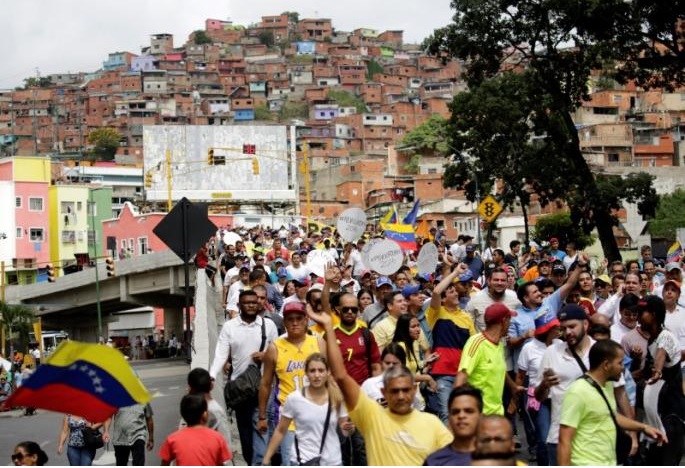CARACAS, (Reuters) – Dressed in white and chanting “this government will fall,” hundreds of thousands of opposition supporters flooded Venezuela’s capital on Thursday to press for an end to President Nicolas Maduro’s rule.
In probably the biggest mass demonstration against the ruling socialists in more than a decade, protesters streamed into Caracas from the Amazon jungle to the western Andes.
The opposition Democratic Unity coalition estimated at least 1 million people took part in the rallies to demand a recall referendum against Maduro and decry the deep economic crisis.
“We are going to bring down Maduro!” said Naty Gutierrez, 53, whose 75-mile (120 km) drive from Maracay into Caracas took three times longer than usual due to soldiers’ roadblocks.
“We are going to defeat hunger, crime, inflation and corruption. They’ve done nothing in 17 years. Their time is finished,” she said, surrounded by thousands of people waving banners and national flags at one gathering point.
The opposition hoped the protests would prove they are the majority and heap pressure on Maduro and the national election board to allow a plebiscite on his rule as allowed by the constitution half-way through a presidential term.
But with the election board dragging its feet over the process and the government swearing the referendum will not happen this year, the opposition has no way to force it no matter how many people it brings onto the streets.
The timing is all-important because should there be a plebiscite in 2017 and Maduro loses, his handpicked vice president would take over for the ruling Socialist Party, rather than triggering a new presidential election.
In power since Hugo Chavez’s presidency from 1999, the socialists have hit a low ebb as falling oil prices and a failing state-led economy have left the OPEC nation in turmoil.
Triple-digit inflation, a third year of recession, shortages of basics, and long lines at shops have exasperated many of Venezuela’s 30 million people. The frustration led to a resounding opposition win in a December legislative vote.
Maduro, 53, says the opposition-dubbed “Takeover of Caracas” on Thursday was a front for coup plans, akin to a short-lived 2002 putsch against his mentor Chavez, who died of cancer three years ago. Maduro has failed to replicate his charismatic predecessor’s popular appeal, and his ratings in opinion polls have halved to just over 20 percent.
“I’m ready for everything … we will not allow a coup,” Maduro told supporters late on Wednesday.
At least a dozen opposition activists have been arrested this week, accused of planning violence around Thursday’s events, according to rights groups and opposition parties.

Extra police and troops were positioned around Caracas, and there were roadblocks on most major routes into the capital from the provinces, with buses being blocked and traffic crawling.
Security forces fired tear gas on one highway where buses were stopped but people tried to continue on foot, pro-opposition broadcaster VivoPlay said. Authorities also used tear gas to block a group of protesters in Caracas who tried to break onto a motorway, witnesses said.
“All they are interested in is staying in power,” said construction worker Luis Palacios, 59, from the poor Caracas neighborhood of Petare. “We want change, we are hungry.”
Dozens of indigenous people marched hundreds of miles from their home state of Amazonas.
Fearing violence, especially given 43 deaths around anti-Maduro protests in 2014, many businesses in the capital closed.
Swearing loyalty to Chavez’s legacy and calling opposition leaders a wealthy elite intent on controlling Venezuela’s oil, thousands of red-shirted government supporters gathered for counter-rallies.
“The opposition want to topple the president, but they won’t be able to,” said lawyer and civil servant Adriana Jimenez, 44, at a government rally of thousands close to a huge inflatable puppet of Chavez in downtown Caracas.
Like other “Chavista” loyalists, she blamed Venezuela’s ailing economy on an “economic war” by businessmen hiking prices and hoarding goods.
Maduro joined his supporters in the afternoon, singing on stage and pumping his fist in the air.









